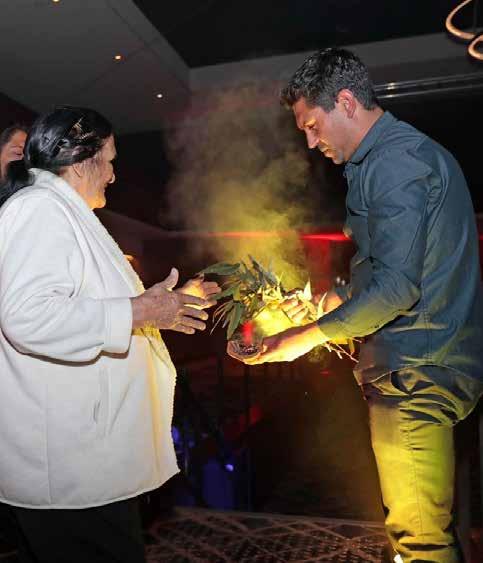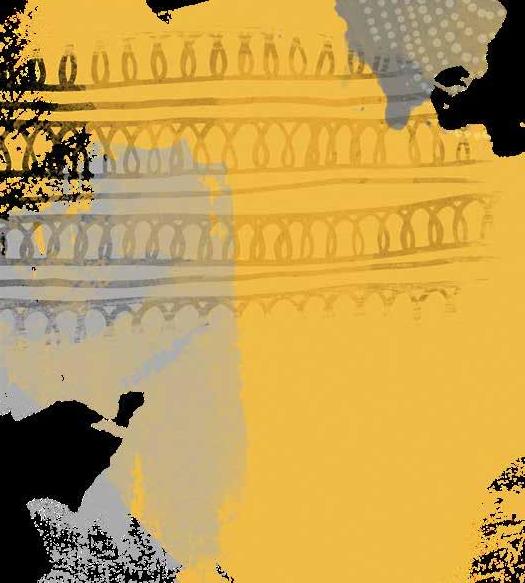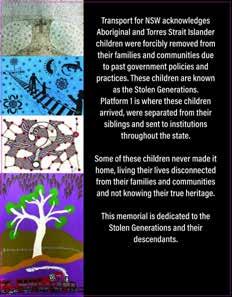
6 minute read
IN CONVERSATION: FIONA MCLEAN AND REBECCA HYLAND


Transport for NSW Reconciliation Action Plan Launch. Photo: Ann-Marie Calihanna
How does a RAP respectfully engage in truth-telling? At the 2021 National RAP Conference, Fiona McLean, a Nyemba woman, and Rebecca Hyland, a Kamilaroi woman, discuss how Transport for NSW’s RAP acknowledged transport’s historical role in the forced removals of Aboriginal and Torres Strait Islander children.
How was the concept of truth-telling raised at Transport for NSW and what did that look like?
FM: When Transport NSW decided to go ahead with our Reconciliation Action Plan (RAP), we got together with our First Nations staff members and peak body partners to look at what we needed to do. The decision came about that for us to have a true RAP, we had to be brave and bold to tell the true history of transport, and the role that transport played in taking many of our Stolen Generations away.
In Central Station, which is the main station in Sydney, platform one was where many of the Stolen Generations children started their painful journeys of separation from family, community and culture. We installed a memorial plaque, which has now become a public reminder to enable all transport staff and citizens passing through to reflect on past removal practices and the impact it’s had on Aboriginal people.
It’s also intended as a platform to begin the healing process, which has been really important. You can’t have true reconciliation without telling some of the painful stories to start that healing process.
How have you brought your staff along on this journey and did you undergo an internal process before this project was implemented?
FM: It’s been an ongoing process. We started the journey a bit prior to our RAP actually being launched and we’ve done various focus groups to instil the messages of the project.
Every opportunity we get, when we’re going to meetings or when we get the chance to talk to our implementation leads or our executive sponsors, we add a little bit more of the truth-telling in there. So it’s not happening overnight, it takes time.
We have an Aboriginal and Torres Strait Islander staff forum on a yearly basis, which is another safe space where we can look at areas where we need to tell more truths and to let other people know our part in the removal of the Stolen Generations. It’s a hard story to tell, but it has to be told.
It’s a hard story to tell, but it has to be told.

What was the general response or reaction both internally and externally when transport started these truth-telling processes?
FM: To start off with I think there was a little bit of scepticism as to how far we would actually tell the truth, or whether we were actually going to walk the talk. Now, I think 18 months into our journey there’s been acceptance and a lot of our staff want to know more about how they can get involved with the truth-telling stories. We’re on the right path.
We have really great working relationships with Stolen Generations’ members who feel that from the plaques and the actual acknowledgment of our part in their removal, their healing process has well and truly begun.
Do you have any reflections or tips on that journey in terms of raising truthtelling as a concept and introducing it as an idea internally and trying to engage everyone in the process?
RH: It’s really about inspiring those that we work with and engage with on a daily basis, and to immerse themselves in the journey and become spiritually connected with us.
For me, it’s also about looking to our next generation. How do we move into that space where my kids can grow up and feel fully immersed and comfortable, where their friends know about Australia’s history and understand the importance of truth-telling?
It’s about bringing people along for the journey around education and employment. When we break down those cycles and really showcase what capabilities we have, what we do and what we can do, that will impact upon our well-being and our mental health.
We have the ability to impact communities and reduce rates of suicide of our brothers and our sisters, our aunts and uncles. It gives hope. Do you have any thoughts on moving beyond raising awareness or the actions taken after that education is unfolded within your communities?
FM: Transport NSW truth-telling will be ongoing. We have actually seen the change in some of the attitudes within our staff members.
We did a roadshow of our RAP after we launched it, because we knew that with 27,000 staff we weren’t going to be able to get everyone together to start this healing process. So we took it on the road by every means of transport that we possibly could, with our message stick and our RAP.
I was on the train with one of my colleagues heading down to Wagga Wagga. We were starting to talk about how we were going to present to the community to bring our non-Indigenous staff along the journey, because we knew our First Nations staff were already on the journey with us.
We were pulled up by two elderly people that were on the train that had overheard us talking and we ended up doing a cultural awareness session for the whole carriage. Then, we got an invitation to speak at a Rotary Club on what reconciliation was. So you just never know where it’s going to happen, but we took the opportunity to take these people on the journey with us as well.
Do you have any advice for individuals who are feeling really motivated and ambitious about reconciliation and raising the idea of truth-telling internally but are not quite sure how to do it?
RH: My advice would be to reach out, connect, have a yarn, continue learning about Aboriginal Australia and our history. Engage with us, have a yarn with your First Nations colleagues and get involved in communities and really look for opportunities to increase Aboriginal and Torres Strait Islander procurement opportunities. Share that journey and share that learning with our younger generation as well. I would encourage organisations to reflect and really examine their RAP commitments and look and trust in their employees to lead and to be creative.
FM: For truth-telling to start, you’ve got to know the history of the organisation you’re working with and some of the past policies. Be prepared to not get it right all the time. Learn from it, but don’t go into a community and say ‘hey, here we are we’re going to make your world wonderful’.
If you have those yarns with community, you need to manage the community expectations as well. Don’t over-promise something that you know that you’re never going to be able to deliver.Work in true partnership with the communities to deliver to their needs, not what you want. Don’t assume one size fits all. Take the time to sit down with community and hear their stories, hear their truths. Don’t make your truths, their truths.

Plaque acknowledging Stolen Generations at Platform One, Central Station, Sydney. Photo: courtesy of Transport for NSW











